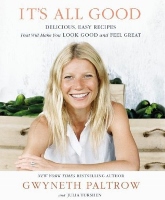 It’s All Good (2013) is a recipe book that contains recipes that meet the guidelines for many current detox and other diets
It’s All Good (2013) is a recipe book that contains recipes that meet the guidelines for many current detox and other diets
- Include whole foods, veggies, lean protein, non-gluten grains
- Avoid gluten, dairy, eggs, white flour, sugar
- Minimize caffeine, alcohol
- Many Asian-influenced and Mediterranean dishes
Get a copy of It’s All Good for pantry guidelines, recipes, and weekly menus (body builder, detox, family-friendly, vegan, and everyday)
It’s All Good – food list and recommendations
The book claims to have recipes for all types of diets:
- Icons for elimination diet, vegan, protein-packed
- Dr. Alejandro Junger’s Clean Program – marked “Elimination”
- Zone diet (40% carbs, 30% fat, 30% protein)
- Paleo diet – many recipes contain beans/legumes and grains and won’t be suitable for many paleo diets, but other recipes are fine
- Macrobiotic diet – some recipes are suitable
- Vegan/plant-based diets – some recipes are suitable, marked “Vegan”
Foods to eat in It’s All Good
Recipes contain these ingredients:
- Proteins
- Sheep’s or goat’s milk dairy, especially yogurt, preferably raw
- Organic eggs, preferably local, from chickens, ducks, and quails
- Fish – caught as locally as possible; no shellfish or deep-water fish (although there are couple of recipes with tuna – okay once in a while). Anchovies, striped bass, cod, flounder, fluke, grouper, halibut, salmon, sea bass, snapper, sole, tuna, whatever is caught locally to you
- Poultry – organic chicken, turkey, and duck, as whole birds, ground meat, fresh sausages, and bacon. No guidelines about how the poultry should be raised
- Red meat – beef, lamb – Gwyneth doesn’t eat any and Julia only eats a little, but there are a couple of recipes in the book. No guidelines about whether the meat should be grass-fed etc.
- Tofu
- Legumes – black beans, cannellini beans, chickpeas, gigante beans, hominy, lentils, navy beans, puy lentils
- Vegetables – fresh
- Acorn squash, artichokes, arugula, asparagus, avocado, beets, bok choy, broccoli, broccoli rabe, brussels sprouts, butternut squash, carrots, cauliflower, celery, Swiss chard, corn, cucumber / English cucumber, daikon radish, eggplant, endive, fennel, green beans / haricots verts, kabocha squash, kale, leeks, lettuce, lotus root, mushrooms (crimini, portobello, shiitake, etc.), Napa cabbage, onions, red onions, parsnips, peas, peppers (bell, poblano, etc.), radishes, romaine, romanesco, scallions, shallots, snow peas, spinach, sweet potato, tomatillos, tomatoes (also canned), cherry tomatoes, turnip, watercress, zucchini
- Fruits
- Apples, apricots, bananas, blueberries, clementines, figs, lemons, limes, mangos, nectarines, oranges, papaya, peaches, pears, strawberries, watermelon
- Dates, dried figs, prunes
- Herbs and spices – fresh
- Basil, bay leaf, chives, cilantro, garlic, ginger, lemon verbena, mint, oregano (also dried), parsley, rosemary, sage, tarragon, thyme
- Cardamom, cayenne pepper, chili flakes, chili powder, cinnamon, cloves, cumin, Chinese five spice powder, ground celery seed, hot chilis, gochujang (Korean red pepper paste), gochugaru (coarse Korean red chili flakes), jalapeños, nutmeg, Old Bay seasoning, turmeric
- Carbohydrates
- Buckwheat, buckwheat flour, buckwheat soba noodles, corn tortillas, gluten-free breadcrumbs, gluten-free flour, millet, old fashioned rolled oats, polenta, organic popcorn kernels, quinoa, quinoa flakes, arborio rice, bomba rice, brown rice, black rice / forbidden rice, rice flakes, rice flour, brown rice flour, brown rice pasta, spelt flour,
- Nuts and seeds
- Almonds, almond butter, almond meal, cashews, unsweetened coconut, pecans, pine nuts, walnuts
- Flaxseeds, pumpkin seeds , sesame seeds (regular or black)
- Goji berries
- Fats and oils
- Canola oil, coconut oil, grapeseed oil, pumpkin seed oil, safflower oil, vegetable oil, extra virgin olive oil, toasted sesame oil, Spectrum organic shortening
- Green olives, kalamata olives
- Condiments / jars and bottles / pantry
- Agar flakes, arrowroot, baking powder, baking soda, dried bonito flakes, capers, chipotle in adobo, fish sauce, harissa paste, pickled jalapeños, kimchi, kuzu root starch, preserved lemons, mirin, GMO-free miso paste, barley miso, mustard (Dijon or coarse seeded), nori seaweed, pickles, sea salt, dried shiitake mushrooms, sweet pimentón, soy sauce, tomato paste, vegetable stock, tahini, tapioca starch, ume plum vinegar, Vegenaise, apple cider vinegar, balsamic vinegar, brown rice vinegar, red wine vinegar, rice wine vinegar, sherry vinegar, white wine vinegar
- Raw cacao powder, dark chocolate chips, whey protein powder, vanilla extract
- Sweeteners
- Agave nectar, date molasses, manuka honey, raw honey, good-quality maple syrup, grade B maple syrup, membrillo (quince) paste, molasses, brown rice syrup, xylitol
- Beverages / liquids
- Plain unsweetened almond milk, vanilla-flavored unsweetened almond milk, apple juice, raw coconut water, rice milk, soy milk
Foods to avoid or limit with It’s All Good
- Cut caffeine
- Cut alcohol consumption
- No white flour
- No sugar
- No cow’s milk dairy (although regular cow’s milk yogurt is okay, and they’ll eat a piece of “ripe, runny, stinky” cow’s milk cheese occasionally)
- No eggs
- No shellfish
- No deep-water fish – not defined, although tuna is included
Consult your doctor before starting a new diet. This page describes what the authors of the diet recommend – Chewfo is describing the diet only, and does not endorse it.
Get a copy of It’s All Good for pantry guidelines, recipes, and weekly menus (body builder, detox, family-friendly, vegan, and everyday)

{ 0 comments… add one }